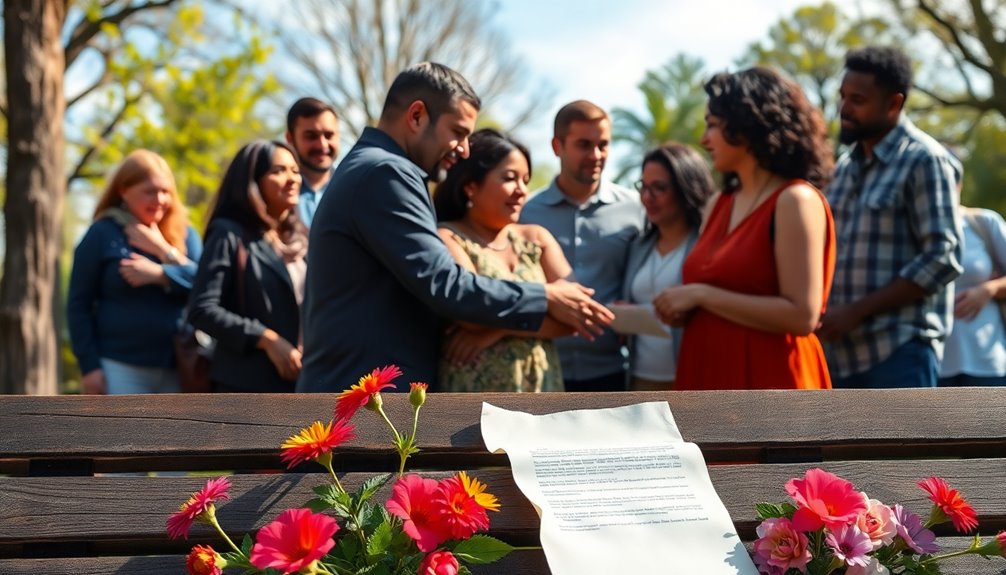To apply Jesus' teachings to everyday life, embrace love and compassion in your interactions. Practice forgiveness by letting go of grudges, which fosters inner peace. Seek humility and engage in acts of service, listening actively to others. Cultivate gratitude and contentment by recognizing your blessings. Prioritize prayer and reflection to align your actions with spiritual values. Finally, build community and foster relationships through kindness and respect. You'll find even deeper insights as you explore further.
Key Takeaways
- Embrace love and compassion in daily interactions to build meaningful connections and foster a supportive community.
- Practice forgiveness by acknowledging feelings and letting go of grudges for emotional well-being and healthier relationships.
- Serve others with humility and engage in active listening to promote respect and understanding among diverse viewpoints.
- Cultivate gratitude and contentment by recognizing blessings and participating in community engagement to strengthen bonds.
- Prioritize prayer and reflection to align actions with Jesus' teachings, fostering personal growth and integrity in daily life.
Embracing Love and Compassion in Daily Interactions

As you navigate your daily interactions, embracing love and compassion can transform even the simplest moments into meaningful connections.
When you approach others with kindness, you create an atmosphere where understanding flourishes. A smile or a kind word can lift someone's spirits and foster a sense of community.
Remember, love isn't just a feeling; it's an action. So, whether it's lending a listening ear to a friend or offering help to a stranger, your compassionate gestures ripple outwards.
Love manifests through our actions; a simple gesture can create a wave of compassion that touches many lives.
Recognize the humanity in everyone you meet, and treat them as you wish to be treated. By infusing your daily encounters with love, you not only enrich your own life but also inspire others to do the same, creating a more compassionate world.
Practicing Forgiveness and Letting Go of Grudges

Forgiveness is essential for your emotional well-being and spiritual growth.
By learning how to let go of grudges, you not only free yourself but also open up to the benefits of inner peace and healthier relationships.
Let's explore the steps you can take to practice forgiveness in your everyday life.
Importance of Forgiveness
When you hold onto grudges, you weigh yourself down with negativity that affects your peace and happiness. Forgiveness isn't just about the other person; it's a gift you give yourself. Releasing resentment opens your heart to love and joy, aligning with Jesus' teachings of compassion.
| Benefits of Forgiveness | Consequences of Holding Grudges |
|---|---|
| Restores inner peace | Increased stress and anxiety |
| Strengthens relationships | Isolation and loneliness |
| Fosters empathy | Bitterness and anger |
| Promotes emotional healing | Stagnation in personal growth |
| Encourages positivity | Diminished overall happiness |
Embracing forgiveness allows you to move forward, freeing yourself from the past. Remember, forgiving doesn't excuse actions; it simply liberates your spirit.
Steps to Let Go
Letting go of grudges can seem challenging, especially after experiencing hurt. Start by acknowledging your feelings; it's okay to feel pain.
Next, reflect on the situation and consider the other person's perspective. This doesn't excuse their behavior, but it helps you understand their actions.
After that, make a conscious decision to forgive. You can say it out loud or write it down—whatever feels right for you. Remember, forgiveness is for your peace, not theirs.
Finally, take small steps to release those negative emotions. Whenever resentment creeps back in, remind yourself of your decision to forgive.
Surround yourself with supportive people who encourage your healing journey. Embrace this process, and you'll find it easier to let go over time.
Benefits of Releasing Grudges
Releasing grudges can profoundly impact your emotional and mental well-being. When you let go of resentment, you free yourself from the burden of negativity that weighs you down.
Forgiveness isn't about condoning someone's actions; it's about reclaiming your peace. By practicing forgiveness, you open the door to healthier relationships and greater empathy, allowing love and compassion to flourish in your life.
You'll likely experience reduced stress and anxiety, leading to improved physical health, too. Letting go of grudges creates space for personal growth and happiness, helping you focus on what truly matters.
Embracing forgiveness aligns with Jesus' teachings, bringing you closer to a life filled with grace, joy, and understanding. So, take the step to release those grudges today.
Seeking Humility and Serving Others

To truly embrace Jesus' teachings, you need to cultivate a humble attitude and prioritize serving others.
Simple acts of kindness can transform your daily interactions and help you connect on a deeper level.
Embrace Humble Attitude
When you embrace a humble attitude, you open yourself up to a deeper understanding of Jesus' teachings and the importance of serving others.
Humility helps you recognize that everyone has value, teaching you to listen and learn from those around you. By letting go of pride, you free yourself to connect with others on a more genuine level.
In your daily interactions, practice kindness and openness.
Acknowledge your limitations and be willing to accept help when needed. This not only strengthens your relationships but also reminds you that we're all in this together.
Acts of Service
While seeking humility, engaging in acts of service can transform not only your perspective but also the lives of those around you.
When you step outside your comfort zone to help others, you learn the value of compassion and generosity. Simple gestures, like volunteering at a local shelter or helping a neighbor, can create a ripple effect of kindness.
As you serve, you'll find joy in selflessness, which fosters deeper connections with others. Remember, Jesus washed the feet of his disciples, showing that true leadership comes from humility.
Each act of service is an opportunity to reflect His love and grace. Moreover, engaging in service helps you develop strong communication skills, which enhance your relationships. So, roll up your sleeves, get involved, and watch how serving others enriches your life and the lives of those you touch.
Value of Listening
Listening is an essential skill that often gets overlooked in our fast-paced lives. When you truly listen, you open yourself up to understanding others better, fostering deeper connections.
Jesus' teachings emphasize humility and service, and active listening is a powerful way to embody these principles. By giving your full attention, you show respect and care for those around you.
It's not just about hearing words; it's about grasping emotions and intentions. This practice can transform your relationships, making others feel valued and appreciated.
Cultivating Gratitude and Contentment

Gratitude and contentment can transform your perspective on life, especially when you embrace the teachings of Jesus. Start by recognizing the blessings you have, no matter how small. Keep a gratitude journal, jotting down things you appreciate each day. This practice shifts your focus from what you lack to what you possess.
Next, practice contentment by resisting the urge to compare yourself to others. Jesus taught that true fulfillment comes from within, not from material possessions. Celebrate your unique journey and trust that you're exactly where you need to be.
Surround yourself with uplifting influences and engage in acts of kindness, which naturally foster gratitude. By cultivating these attitudes, you'll find joy and peace in everyday moments.
Prioritizing Prayer and Reflection

To truly embrace Jesus' teachings, prioritizing prayer and reflection is essential for deepening your spiritual connection.
Set aside specific times each day to engage in prayer, whether it's in silence or through spoken words. This intentional practice helps you center your thoughts and connect with God.
In addition, take time to reflect on your day, considering how your actions align with Jesus' values.
Journaling can be a great tool for this; it allows you to process your feelings and recognize areas for growth.
Building Community and Fostering Relationships

While you focus on personal prayer and reflection, building community and fostering relationships with others is equally essential in living out Jesus' teachings. Engage with your neighbors and seek opportunities to connect. Attend local gatherings, volunteer at community events, or join a small group at your church.
These interactions help you develop meaningful bonds and create a support system rooted in faith.
Practice active listening and show genuine interest in others' lives. Offer kindness, encouragement, and help when needed. By embodying love and compassion, you reflect Jesus' message and strengthen community ties.
Living With Integrity and Authenticity

Building strong relationships within your community sets a foundation for living with integrity and authenticity. You can embody these values by being honest, transparent, and consistent in your actions. When you align your words with your deeds, you foster trust and respect among those around you.
To help you reflect on your journey, consider these key areas:
| Area | Practice | Outcome |
|---|---|---|
| Honesty | Share your true thoughts openly | Builds trust |
| Consistency | Follow through on promises | Establishes reliability |
| Transparency | Own your mistakes | Encourages vulnerability |
| Respectfulness | Listen actively to others | Strengthens connection |
Embracing unconditional love in your relationships can further enhance your integrity and authenticity.
Frequently Asked Questions
How Can I Find Time for Prayer in a Busy Schedule?
You've got a schedule bursting at the seams—meetings, errands, and a million things pulling you in every direction!
Finding time for prayer might feel like searching for a needle in a haystack. But it doesn't have to be that way. Carve out just five minutes in the morning or before bed.
Turn mundane moments, like commuting or cooking, into mini prayer sessions. You'll discover that connecting with your spirit can fit into your whirlwind life!
What Are Practical Ways to Show Love in Difficult Situations?
In difficult situations, showing love can be challenging, but it's essential. You can start by listening actively to others, validating their feelings, and offering support.
Small acts of kindness, like a comforting word or a helping hand, can make a big difference. Even when tensions rise, try to respond with patience and understanding.
How Do I Handle Conflicts While Practicing Forgiveness?
When you handle conflicts, start by calming yourself before addressing the issue. Acknowledge your feelings, but don't let them control your response.
Listen actively to the other person's perspective; it shows respect and opens the door to resolution. Practice empathy—try to understand their motives.
Remember, forgiveness isn't about excusing behavior; it's about freeing yourself from anger.
Finally, communicate openly about your feelings and seek common ground to resolve the conflict.
What if Others Don't Reciprocate My Acts of Kindness?
You're handing someone a warm cup of coffee, but they seem oblivious to your kindness.
It can sting when your gestures aren't returned. Remember, kindness isn't a transaction; it's a gift.
Focus on the joy you bring, not what you receive. You might inspire others to follow your lead, even if it takes time.
Keep shining your light, and trust that your actions can create ripples of positivity in unexpected ways.
How Can I Encourage My Community to Embrace These Teachings?
To encourage your community to embrace these teachings, start by leading by example. Show kindness and compassion in your daily interactions.
Organize community events where everyone can come together and share their experiences. Use social media to highlight positive stories and encourage discussions.
Create small groups where people can explore these teachings together. When you actively engage and inspire others, you'll foster an environment where these values can thrive and resonate.
Conclusion
By weaving Jesus' teachings into your daily life, you create a beautiful tapestry of love, forgiveness, and humility. Imagine planting seeds in a garden: each act of kindness you share is a seed that grows into a vibrant flower. Just as a garden flourishes with care and attention, your spirit thrives when you prioritize prayer, community, and authenticity. Embrace these principles, and watch how your life transforms into a rich landscape of grace and connection.










